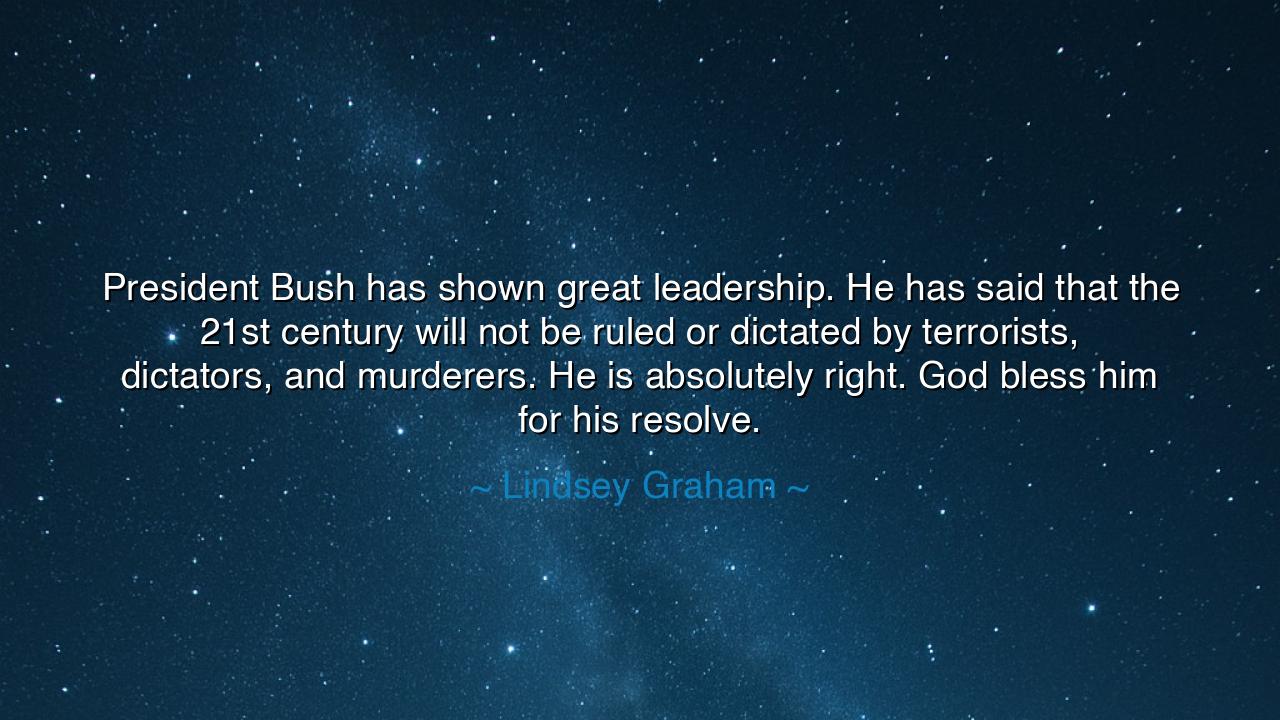
President Bush has shown great leadership. He has said that the
President Bush has shown great leadership. He has said that the 21st century will not be ruled or dictated by terrorists, dictators, and murderers. He is absolutely right. God bless him for his resolve.






When Lindsey Graham declared, “President Bush has shown great leadership. He has said that the 21st century will not be ruled or dictated by terrorists, dictators, and murderers. He is absolutely right. God bless him for his resolve,” he spoke in a moment of fire and conviction — a time when the wounds of the world were still open, and the future seemed uncertain. His words were not mere praise, but a cry of defiance — a statement of moral clarity in an age threatened by chaos. In this quote, Graham invokes the eternal tension between order and tyranny, between those who would use fear to enslave and those who would rise with courage to defend freedom.
The origin of this quote lies in the years following the September 11th attacks, when the world was shaken and the United States faced a great test of will. President George W. Bush, standing before his people and before history, had declared that the coming century must not belong to those who kill in the name of hatred, but to those who stand for justice and liberty. In these words, Graham saw more than policy — he saw leadership, the ancient virtue of standing firm when the world trembles. His praise was an acknowledgment of the timeless truth that leadership is not the absence of fear, but the courage to act despite it.
To understand Graham’s conviction, one must remember that every age of man faces its own darkness. In the 20th century, tyrants rose who sought to dominate the earth through terror — Hitler, Stalin, Mao — men whose ideologies turned millions into ashes. They too were once thought unstoppable, until free nations stood together in defiance. So too in the early years of the 21st century, a new kind of shadow emerged — not in the form of vast armies, but in terrorism, the weapon of cowards who strike at the innocent to rule by fear. In this context, Bush’s words, and Graham’s echo of them, stand as a continuation of the same moral struggle that has existed since the dawn of civilization: the battle between freedom and oppression, light and darkness.
The leadership Graham praises is not leadership of comfort or convenience, but of resolve. It is the kind of leadership that bears the loneliness of hard choices, the burden of responsibility, and the scorn of critics — yet does not falter. In ancient times, men like Pericles of Athens or Cincinnatus of Rome embodied this spirit, standing before their people not as kings, but as servants of a higher duty. They understood that freedom is not preserved by words alone, but by the unyielding spirit of those who defend it. So too did Graham recognize in Bush’s defiance a reflection of that ancient spirit — the belief that evil must be confronted, not appeased.
And yet, the words carry more than praise for a single man — they are a call to vigilance for every generation. For the enemies of liberty wear many masks: sometimes they rise in violence, sometimes in corruption, sometimes in apathy. The fight against terror, dictatorship, and murder is not fought only on battlefields, but in the hearts of people who choose courage over complacency. To say that the 21st century must not be ruled by such forces is to remind humanity that peace is not the absence of struggle, but the triumph of conscience.
There is also a deeper spiritual dimension in Graham’s words. When he says, “God bless him for his resolve,” he acknowledges that courage without faith can easily become arrogance. The greatest leaders are not those who believe themselves infallible, but those who recognize a power higher than themselves — a divine justice that guides human strength toward righteousness. This echoes the humility of ancient kings who prayed before battle, knowing that their cause must be just or their strength would be in vain. Leadership rooted in moral clarity and humility becomes not domination, but stewardship — the defense of humanity’s sacred dignity.
The lesson in this quote reaches beyond politics and war. It teaches that in every sphere of life — in families, in communities, in nations — there will always be forces that seek to rule by fear. And there will always be those who must rise with resolve and say, “No.” Leadership, as Graham describes it, is not confined to presidents or generals; it belongs to every soul that chooses courage over surrender. To lead, one must first believe — in justice, in truth, and in the inherent worth of human life.
So let these words of Lindsey Graham, born in a time of trial, echo through the centuries as a reminder: Resolve is the shield of the free. The 21st century, like all centuries before it, will be shaped by those who refuse to be ruled by fear. Whether on the world stage or within the quiet battles of the heart, let each person stand firm in the face of darkness and say, “This age shall belong not to the destroyers, but to the builders.” For in the end, history remembers not those who ruled by terror, but those who led by courage.






AAdministratorAdministrator
Welcome, honored guests. Please leave a comment, we will respond soon